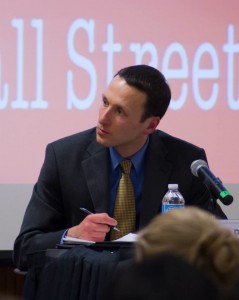 Three panelists came together at UR to discuss the future of finance in the U.S. on Tuesday, April 8.
Three panelists came together at UR to discuss the future of finance in the U.S. on Tuesday, April 8.
The program was organized by Politics and Markets and moderated by Associate Professor of Political Science and Business Administration David Primo. Members of the panel included senior fellow at the Mercatus Center at George Mason University Hester Peirce, senior fellow at the Manhattan Institute Nicole Gelinas, and Communications Director for The Other 98%, a grassroots organization that according to its website, fights against “undue corporate influence,” Alexis Goldstein.
Primo explained that he picked this topic because he knew it was something people could relate to.
“Finance affects every aspect of our lives, yet it is a topic that is very complicated. I wanted to help students see the link between Wall Street and their lives” Primo said.
Primo discussed his selection of panelists.
“I selected panelists that were skilled at explaining complex ideas to an educated but non-expert audience, and who would offer competing perspectives.”
Peirce’s credentials include acting as senior counsel to Senator Richard Shelby’s staff on the Senate Committee on Banking, Housing, and Urban Affairs. She also served as an attorney for the Securities and Exchange Commission and as counsel on the Commission to Commissioner Paul S. Atkins.
During her presentation, she expressed the need for the government to deregulate and let banks make their own decisions. This ideology came as a conclusion to the research that has been conducted regarding the effect of the Dodd-Frank Act on small banks and the general difficulty of truly complying with thousands of pages of complicated compliance documents. This act is lawmakers’ attempt to rectify some of the perceived problems perceived to have led to the 2008 financial crisis.
She explained that regulations, if there are any at all, must be simple because the complicated version that lawyers create require people with specialized knowledge to interpret, helping to contribute to the revolving door between Wall Street regulators and Wall Street itself, and also hurting small banks.
“The regulations can inadvertently shut down part of the banking sector as these bankers decide, ‘you know what, I didn’t go into business to become a compliance person — I went into business to make loans to people, and this is just not what I’m allowed to do anymore.’”
However, she did explain that capitalization of banks is needed, and stockholders need to be seen as more important. If banks are more beholden to stockholders they have more at stake, whereas other forms of bank stockholders, such as people with accounts, get back their money through other means like the Federal Deposit Insurance Corporation.
Gelinas is a Chartered Financial Analyst and a member of the New York Society of Securities Analysts. Prior to her work with the Manhattan Institute, she worked as a business journalist for Thomson Financial covering international syndicated-loan and private-debt markets.
Gelinas’ ideology is that some regulation is okay. She discussed the ban on high interest loans in New York. She believes that the government needs to foster more accountability in banks, allowing banks to see the negative consequences of their actions. This would result in greater discretion in investment. Banks’ fates would also be more linked to their stockholders.
“If the Reagan administration had decided, ‘let’s just let the banks fail,’ what would the results have been?” Gelinas said. “There could have been a broader market panic, perhaps downturn in economy before reelection, but the lesson to the market would have been beneficial. The lesson that would have gone out to global bondholder and global investors who had put money in bank would have been, ‘be careful what you invest in this new and changing world.’”
She continued to explain that this set the precedent for “too -big-to-fail banks,” and they, along with their investors, have learned that if they melt down, the government will bail them out.
Goldstein worked on Wall Street for seven years in technology before deciding to pursue a different path. After joining Occupy Wall Street, she joined Occupy the SEC (Securities and Exchange Commission). Though she is no longer an active member, she was a critical part in a comment letter send to Congress regarding a specific part of Dodd-Frank called the Volcker Rule.
This rule restricts banks from making speculative investments that are not in the best interest of their customer.
From her work on Wall Street, Goldstein said she saw injustices against customers and fights for more government intervention and regulation for banks. This regulation would help people understand the risks and benefits of investing/banking with a particular company.
“Wall Street is a cult of smartness, and if you get screwed, it’s your fault because you weren’t smart enough and you didn’t read the fine print that they buried deliberately in the footnotes,” Goldstein said. “Ripping your client’s face off is a two step process: step one is you give your client the worst deal you could possibly give them, but step two is you make them think that it’s a bargain and that you did not rip your clients face off if they know they’ve been screwed.”
Professor Primo thought the event went well.
“I thought the panelists did a great job of offering strong views and challenging one another while at the same time respecting differing opinions,” he said. “It’s a model for how policy discussions ought to be conducted.”
Primo said he expects another event to occur during Meliora Weekend next semester.
Johnson is a member of the class of 2016.




